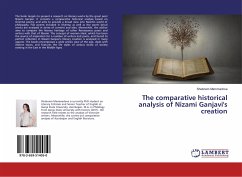
Ode Genre in XV Century Turkish Poetry
Monograph
Versandkostenfrei!
Versandfertig in 1-2 Wochen
36,99 €
inkl. MwSt.

PAYBACK Punkte
18 °P sammeln!
This monograph analyzes the genre of ode, which formed the basis of the classical literature of the East, which played a special role in the development of genres, its stages of development, the most prosperous period of Turkish ode in the poems of the XV century. The hymns that come up as a result of the emergence and development of a particular dynasty in the political arena, as well as the philosophical poems that emerged as a result of the exchange of new concepts, interpretations, odes and worldviews, are of great importance in revealing the socio-political, moral and philosophical image....
This monograph analyzes the genre of ode, which formed the basis of the classical literature of the East, which played a special role in the development of genres, its stages of development, the most prosperous period of Turkish ode in the poems of the XV century. The hymns that come up as a result of the emergence and development of a particular dynasty in the political arena, as well as the philosophical poems that emerged as a result of the exchange of new concepts, interpretations, odes and worldviews, are of great importance in revealing the socio-political, moral and philosophical image.The analysis in the monograph shows that the line of development of Turkish poems is connected with the strengthening of the power of the Timurid dynasty, the rise of the Turkish (Uzbek) language during this period, the creation of the most beautiful Turkish poems during this period.












